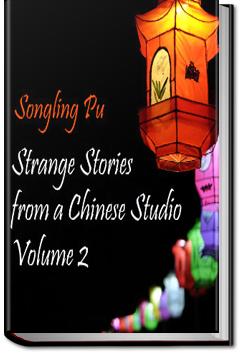UNLIMITED Audiobooks and eBooks
Over 40,000 books & works on all major devices
Get ALL YOU CAN for FREE for 30 days!
Strange Stories from a Chinese Studio - Volume 2
Songling Pu
Book Overview:
"Strange Tales from a Chinese Studio" or "Strange Tales of Liaozhai" is a collection of nearly five hundred mostly supernatural tales written by Pu Songling during the early Qing Dynasty. It was written in Classical Chinese rather than Vernacular Chinese. Pu is believed to have completed the majority of the tales sometime in 1679, though he could have added entries as late as 1707. He borrows from a folk tradition of oral storytelling to put to paper a series of captivating, colorful stories, where the boundary between reality and the odd or fantastic is blurred. The cast of characters includes vixen spirits, ghosts, scholars, court officials, Taoist exorcists and beasts. Moral purposes are often inverted between humans and the supposedly degenerate ghosts or spirits, resulting in a satirical edge to some of the stories. Ghosts and spirits are often bold and trustworthy, while humans are on the other hand weak, indecisive and easily manipulated, reflecting the author's own disillusionment with his society. ( Wikipedia)
"Strange Tales from a Chinese Studio" or "Strange Tales of Liaozhai" is a collection of nearly five hundred mostly supernatural tales written by Pu Songling during the early Qing Dynasty. It was written in Classical Chinese rather than Vernacular Chinese. Pu is believed to have completed the majority of the tales sometime in 1679, though he could have added entries as late as 1707. He borrows from a folk tradition of oral storytelling to put to paper a series of captivating, colorful stories, where the boundary between reality and the odd or fantastic is blurred. The cast of characters includes vixen spirits, ghosts, scholars, court officials, Taoist exorcists and beasts. Moral purposes are often inverted between humans and the supposedly degenerate ghosts or spirits, resulting in a satirical edge to some of the stories. Ghosts and spirits are often bold and trustworthy, while humans are on the other hand weak, indecisive and easily manipulated, reflecting the author's own disillusionment with his society. ( Wikipedia)
How does All You Can Books work?
All You Can Books gives you UNLIMITED access to over 40,000 Audiobooks, eBooks, and Foreign Language courses. Download as many audiobooks, ebooks, language audio courses, and language e-workbooks as you want during the FREE trial and it's all yours to keep even if you cancel during the FREE trial. The service works on any major device including computers, smartphones, music players, e-readers, and tablets. You can try the service for FREE for 30 days then it's just $19.99 per month after that. So for the price everyone else charges for just 1 book, we offer you UNLIMITED audio books, e-books and language courses to download and enjoy as you please. No restrictions.
Next morning Tou amused himself by helping the Princess to paint her face,[45] and then, seizing a girdle, began to measure the size of her waist[46] and the length of her fingers and feet. “Are you crazy?” cried she, laughing; to which Tou replied, “I have been deceived so often by dreams, that I am now making a careful record. If such it turns out to be, I shall still have something as a souvenir of you.” While they were thus chatting a maid rushed into the room, shrieking out, “Alas, alas! a great monster has got into the palace: the Prince has fled into a side chamber: destruction is surely come upon us.” Tou was in a great fright when he heard this, and rushed off to see the Prince, who grasped his hand and, with te. . . Read More
Try now for FREE!

"Love your service - thanks so much for what you do!"
- Customer Cathryn Mazer
"I did not realize that you would have so many audio books I would enjoy"
- Customer Sharon Morrison
"For all my fellow Audio Book & E-Book regulars:
This is about as close to nirvana as I have found!"
- Twitter post from @bobbyekat



Community Reviews
I've been reading a lot of "difficult" books recently, and a few short books that just weren't very good. Amid that pile, Pu's tales were a glorious reminder of why people enjoy telling stories, why people enjoy reading them, and how many different ways something can be interesting.
Short of listing
Άνθρωποι, ζώα και παράξενα πλάσματα ζουν σε έναν κόσμο σαν αυτόν που ξέρουμε αλλά και αυτόν που δεν βλέπουμε. Οι ιστορίες του Που Σονγκλίνγκ είναι πιο πολύ λαϊκά παραμύθια, γεμάτα μαγεία και υπερφυσικά στοιχεία, κάνουν τον πολιτισμό των Κινέζων οικείο (χελόου Αίσωπε) αλλά και άγνωστο.
Αν αφήνει μία
"Read these tales properly, and they will make you strong and brave; read them in the wrong way, and they will possess you."
- Feng Zhenluan
Early nineteenth century commentator on the Strange Tales
I honestly don’t know how to begin with reviewing a book like this. Normally with short story collection
According to John Minford (whose translation in the Penguin edition of some of these strange tales is my preferred translation of this book: Strange Tales from a Chinese Studio), what readers are about to experience here are
"longer stories with complex plots, often involving relationships between m
《聊齋誌異》的經典選篇,而非全集
nicely terped
although the selected stories are not in the round(you know, at that time, the terp translated this directly from classical chinese, it was so hard, absolutely much more harder than reading old english, such as BEOWULF, for me), but it still gives me a fresh stunning exp
This is the kind of book that, when read carefully, can transform the English reader from perfect ignorance of Chinese culture to nerd-like engagement with aesthetics, society, history, mythology, folklore, science, medicine, technology, and the list goes on and on. It's really worth remembering how